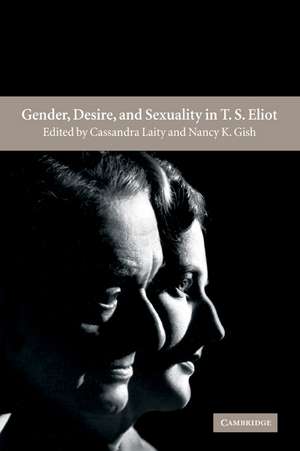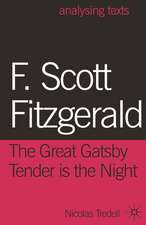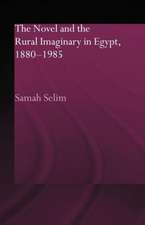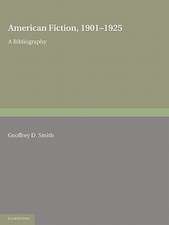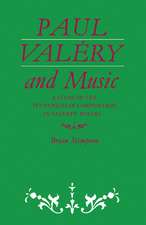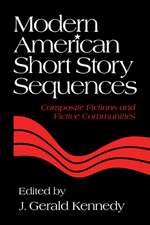Gender, Desire, and Sexuality in T. S. Eliot
Editat de Cassandra Laity, Nancy K. Gishen Limba Engleză Paperback – 15 aug 2007
| Toate formatele și edițiile | Preț | Express |
|---|---|---|
| Paperback (1) | 361.40 lei 43-57 zile | |
| Cambridge University Press – 15 aug 2007 | 361.40 lei 43-57 zile | |
| Hardback (1) | 696.60 lei 43-57 zile | |
| Cambridge University Press – 27 oct 2004 | 696.60 lei 43-57 zile |
Preț: 361.40 lei
Nou
Puncte Express: 542
Preț estimativ în valută:
69.15€ • 72.40$ • 57.22£
69.15€ • 72.40$ • 57.22£
Carte tipărită la comandă
Livrare economică 07-21 aprilie
Preluare comenzi: 021 569.72.76
Specificații
ISBN-13: 9780521039468
ISBN-10: 0521039460
Pagini: 280
Dimensiuni: 153 x 225 x 15 mm
Greutate: 0.41 kg
Ediția:New.
Editura: Cambridge University Press
Colecția Cambridge University Press
Locul publicării:Cambridge, United Kingdom
ISBN-10: 0521039460
Pagini: 280
Dimensiuni: 153 x 225 x 15 mm
Greutate: 0.41 kg
Ediția:New.
Editura: Cambridge University Press
Colecția Cambridge University Press
Locul publicării:Cambridge, United Kingdom
Cuprins
Acknowledgements; Notes on contributors; Introduction: Eliot, gender and modernity Cassandra Laity; Part I. Homoeroticisms: 1. The love song of T. S. Eliot: elegiac homoeroticism in the early poetry Colleen Lamos; 2. T. S. Eliot, famous clairvoyante Tim Dean; 3. 'Cells in one body': nation and eros in the early work of T. S. Eliot Michele Tepper; 4. The masculinity behind the ghosts of modernism in Eliot's Four Quartets Peter Middleton; Part II. Desire: 5. Discarnate desire: T. S. Eliot and the poetics of dissociation Nancy K. Gish; 6. Mimetic desire and the return to origins in The Waste Land Jewel Spears Brooker; 7. Theorizing emotion in Eliot's poetry and poetics Charles Altieri; Part III. Modern Women: 8. Through schoolhouse windows: women, the academy and T. S. Eliot Gail McDonald; 9. T. S. Eliot speaks the body: the privileging of female discourse in Murder in the Cathedral and The Cocktail Party Richard Badenhausen; 10. T. S. Eliot, women and democracy Rachel Potter; 11. Vipers, viragos and spiritual rebels: women in T. S. Eliot's Christian society plays Elisabeth Däumer; Index.
Recenzii
'New Criticism … is dedicated to professionally structured and articulated expositions of technique at the expense of professionally structured and articulated expositions of social meaning. What Laity means by 'unthinkable merges' is that the professional critic should attempt to bridge the gulf. This is what many of the essays in Laity and Gish's important and useful collection do. Eliot construed as the 'last stronghold' of an antiquated critical tendency is already very near to Eliot construed as a psychoanalytic exemplum of repression - and the methodology of many of the essays harmonizes with this highly suggestive description of their subject … Peter Middleton, in 'The Masculinity behind the Ghosts of Modernism in Eliot's Four Quartets', offers an ingenious interpretation of Eliot's later poetry which recasts its long acknowledged cultural conservatism in Freudian terms as a failure of mourning … Charles Altieri's 'Theorizing Emotions in Eliot's Poetry and Politics' sets itself against strong Freudian readings of Eliot, seeking instead to describe and evaluate Eliot's achievement in transforming the emotional content and power of poetry … I think it is a remarkable and fecund comparison. The essay impressively repositions the critic addressing 'Eliot's sexuality' by asking her to recognize in Eliot's singular transformation of the emotional content of poetry a direct challenge to her own habits of negotiating the desire for authentic self-expression.' Year's Work in Critical and Cultural Theory
'… it provides valuable insight for those interested in modernism and gender, and it is absolutely essential reading for scholars of Eliot.' Twentieth Century Literature
'… it provides valuable insight for those interested in modernism and gender, and it is absolutely essential reading for scholars of Eliot.' Twentieth Century Literature
Descriere
A collection of essays on sexuality, desire and feminism in T. S. Eliot's work.
